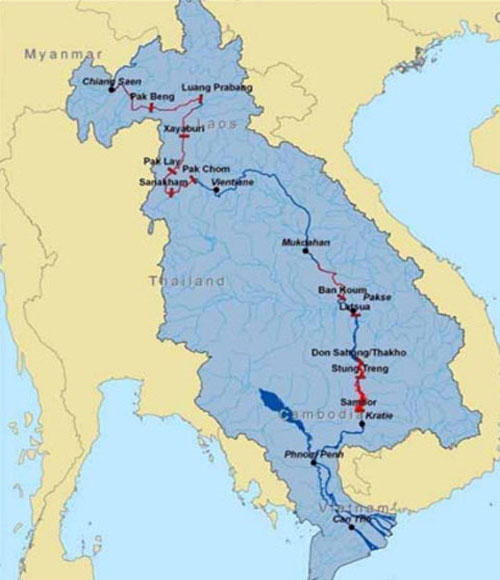Experts call on Laos to abandon the hydroelectric dam
After the Mekong River Commission (MRC) decided to discuss more about Laos' controversial hydropower dam, scientists and environmental organizations in the region continued to call on Laos to stop this project.
On April 19, the MRC expert meeting did not come to a conclusion on whether to approve the Xayaburi project, the Lao hydroelectric dam on the mainstream of the Mekong River. The project will be discussed at the ministerial level.
Thailand, Cambodia and Vietnam believe that further research on the trans-boundary impact of the project is needed, assuming that this dam will be detrimental to the food supply, water and sediment impacts. to tens of millions of people living on both sides of the river.

Location of hydropower dam projects is expected on the mainstream of the Mekong River. Graphic: Dao Trong Tu.
Ms. Ame Trandem, the organization of the International Rivers Network (IRN), said: " The Mekong River is an invaluable resource that we must not waste. Cross-border impacts caused by Xayaburi need to be assessed. unified way between governments and people in the region " .
" From the trans-boundary impacts of the Xayaburi dam, we call for the cancellation of this project ."
Although the six-month consultation process has not yet been completed, according to a Thai investigative report, the Lao side has begun to build infrastructure conditions for the controversial hydropower project 5 months ago.
Ms. Pianporn Deetes, also from IRN said that Laos' construction activities need to stop immediately, personnel and machinery also need to be withdrawn from the area.
Talking about the April 19 decision of the Mekong Commission, Chhith Sam Ath, a member of the Cambodian NGO Organization Forum, said: ' Delaying the construction of the Xayaburi dam is a recognition of the long-term impact of the dam reaches the Mekong ecosystems and millions of people in the region. We hope Laos will respect the MRC decision " .
Ms. Wei Thi Khanh from the Vietnam Center for Water Resources Conservation and Development (WARECOD) said: ' We expect regional governments to learn more about the river before a hasty decision is taken. and can threaten the river ecosystem and the livelihoods of millions '.
Jirasak Inthayos from Chiang Khong district, Chiang Rai province, who participated in a rally on April 19 in Bangkok, Thailand against the construction of the Xayaburi dam, said: ' We are glad that the Xayaburi project has been halted, But we will continue to fight for the Mekong. We will continue to push the Thai government to cancel the agreement to buy electricity from the Xayaburi Dam ".
The International Conservation Union (WWF) supports the decision to postpone dam construction on the mainstream of the Mekong, including the Xayaburi dam, within 10 years to ensure that all construction impacts and dam operation is assessed comprehensively.
' Any decision made will affect the next generation,' said Dr Jian-hua Meng, WWF International Hydropower expert.
According to Dao Trong Tu, former deputy secretary-general of the Mekong River Commission, the results of the April 19 meeting could be said to be a success for the countries of the lower Mekong River.
"Laos mainly sells electricity to Thailand and Vietnam. Therefore, if the two countries work together firmly to buy electricity, they will have to reconsider, because the main purpose of dam construction is to export electricity" , Mr. Tu said.
Xayaburi is one of 11 hydropower projects of many countries expected to be located downstream of the mainstream of the Mekong. This project is located entirely in the territory of Laos, nearly 2,000 km from the Mekong Delta. The proposed hydroelectric dam is 810 meters long, 32 meters high, with an expected capacity of 1,260 MW. Most of the output of this $ 3.5 billion project will be sold to Thailand.
- No decision has been made on Lao hydroelectric dam
- Discover the world's largest hydroelectric dam
- The US supported the postponement of the construction of the Lao hydroelectric dam
- The construction site of the second largest hydropower station in the world
- Laos still built roads to Xayaburi project
- 'Conquering' the Da River to build Hoa Binh Hydroelectricity
- The world's largest hydroelectric dam has many consequences
- Sao la is captured in Laos
- Is the Three Gorges Dam in China deformed?
- Hydroelectric dams can cause 70% extinction of wildlife
- South Africa hydroelectric dam has a capacity of 480 billion liters of running water
- Chinese hydroelectric dams slow down the Earth
 Is the magnetic North Pole shift dangerous to humanity?
Is the magnetic North Pole shift dangerous to humanity? Washington legalizes the recycling of human bodies into fertilizer
Washington legalizes the recycling of human bodies into fertilizer Lightning stone - the mysterious guest
Lightning stone - the mysterious guest Stunned by the mysterious sunset, strange appearance
Stunned by the mysterious sunset, strange appearance